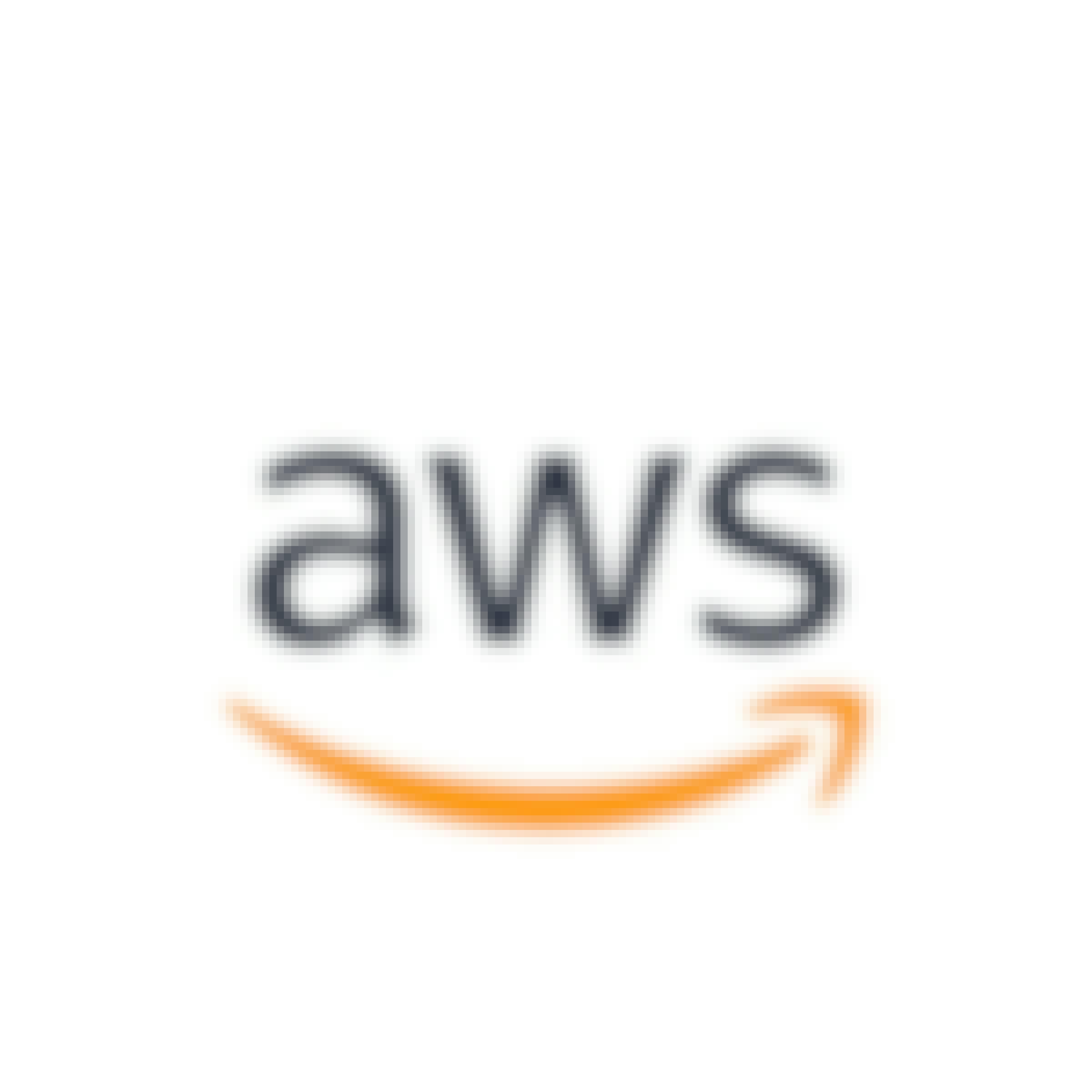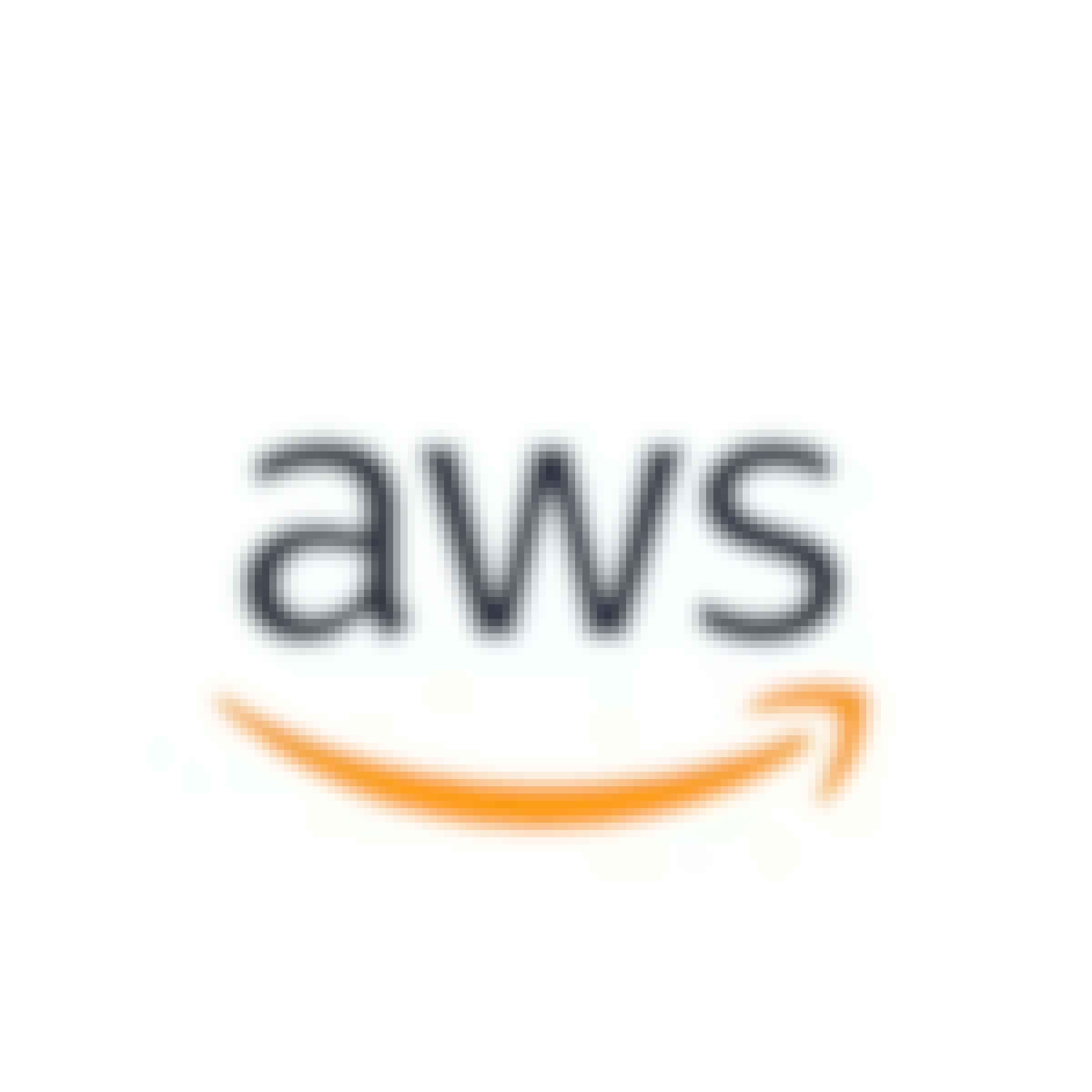- Browse
- Aws Lambda
Results for "aws lambda"
 Status: Free TrialFree TrialStatus: AI skillsAI skillsA
Status: Free TrialFree TrialStatus: AI skillsAI skillsAAmazon Web Services
Skills you'll gain: AWS Identity and Access Management (IAM), Amazon CloudWatch, Amazon DynamoDB, Amazon Web Services, Cloud Computing, Amazon S3, Scalability, Cloud Infrastructure, Amazon Elastic Compute Cloud, Cloud Security, Cloud Computing Architecture, Serverless Computing, Cloud Storage, Databases, Virtual Networking, General Networking, Containerization
4.8·Rating, 4.8 out of 5 stars6.3K reviewsBeginner · Course · 1 - 4 Weeks
 Status: NewNewStatus: Free TrialFree Trial
Status: NewNewStatus: Free TrialFree TrialSkills you'll gain: API Gateway, Amazon CloudWatch, API Design, Amazon Web Services, Microservices, Event-Driven Programming
Beginner · Course · 1 - 4 Weeks
 Status: NewNew
Status: NewNewSkills you'll gain: Amazon Web Services, Amazon Elastic Compute Cloud, Cloud Deployment, Amazon CloudWatch, Serverless Computing, Scalability, Performance Tuning, Event-Driven Programming, Application Performance Management, Capacity Management, Event Monitoring
Intermediate · Course · 1 - 4 Weeks
 A
AAmazon Web Services
Skills you'll gain: Software Architecture, Amazon DynamoDB, Database Management, Cloud Applications, Amazon Web Services, Event-Driven Programming, API Gateway, Relational Databases, Cloud Development, Serverless Computing, Python Programming, Cloud API, Service Oriented Architecture, Microservices, NoSQL, Application Development, Web Development, Automation
4.6·Rating, 4.6 out of 5 stars104 reviewsBeginner · Course · 1 - 4 Weeks
 D
DDuke University
Skills you'll gain: Serverless Computing, Amazon Web Services, Rust (Programming Language), Debugging, Application Deployment, Development Environment, Linux
Beginner · Guided Project · Less Than 2 Hours
 Status: Free TrialFree TrialA
Status: Free TrialFree TrialAAmazon Web Services
Skills you'll gain: AWS Identity and Access Management (IAM), Amazon CloudWatch, Amazon Web Services, Serverless Computing, Amazon DynamoDB, Cloud Computing, Amazon S3, Scalability, Cloud Infrastructure, Event-Driven Programming, Cloud Storage, Solution Architecture, Cloud Computing Architecture, Data Migration, API Gateway, Amazon Elastic Compute Cloud, Public Cloud, Database Systems, Software Architecture, Cloud Security
4.8·Rating, 4.8 out of 5 stars6.8K reviewsBeginner · Specialization · 1 - 3 Months
What brings you to Coursera today?
 A
AAmazon Web Services
Skills you'll gain: AWS CloudFormation, Serverless Computing, Infrastructure as Code (IaC), Amazon Web Services, API Gateway, Application Programming Interface (API), Cloud Infrastructure, Event-Driven Programming, Cloud Deployment, Authentications, Amazon S3, Automation, Amazon DynamoDB, Scalability
4.9·Rating, 4.9 out of 5 stars21 reviewsBeginner · Course · 1 - 4 Weeks
 Status: FreeFreeA
Status: FreeFreeAAmazon Web Services
Skills you'll gain: Cloud Security, Amazon Web Services, Encryption, AWS Identity and Access Management (IAM), Amazon S3, Data Security, Cryptography, Personally Identifiable Information
4.9·Rating, 4.9 out of 5 stars45 reviewsMixed · Course · 1 - 4 Weeks
 Status: Free TrialFree TrialP
Status: Free TrialFree TrialPPearson
Skills you'll gain: Amazon Web Services, Cloud Applications, Amazon S3, Cloud Development, Serverless Computing, Amazon Elastic Compute Cloud, Amazon DynamoDB, Application Development, Data Store, Application Design, Software Development Tools, Database Application, API Gateway, Platform As A Service (PaaS), Cloud Deployment, Cloud Services, Application Deployment, Web Services, Scalability
Intermediate · Course · 1 - 4 Weeks
 Status: FreeFreeA
Status: FreeFreeAAmazon Web Services
Skills you'll gain: Amazon Elastic Compute Cloud, Amazon Web Services, Performance Tuning, Cloud Infrastructure, Infrastructure As A Service (IaaS), Cloud Services, Capacity Management
4.6·Rating, 4.6 out of 5 stars102 reviewsBeginner · Course · 1 - 4 Weeks
 C
CCoursera
Skills you'll gain: AWS CloudFormation, Amazon Web Services, Amazon Elastic Compute Cloud, Event-Driven Programming, Serverless Computing, Event Monitoring, Software Engineering
4.8·Rating, 4.8 out of 5 stars8 reviewsBeginner · Guided Project · Less Than 2 Hours
 Status: NewNewStatus: Free TrialFree Trial
Status: NewNewStatus: Free TrialFree TrialSkills you'll gain: Serverless Computing, API Gateway, Extensible Markup Language (XML), JSON, Amazon Web Services, Cloud Deployment, Cloud Development, Application Programming Interface (API), Cloud Applications, Restful API, Data Processing, Data Transformation
Beginner · Course · 1 - 4 Weeks
In summary, here are 10 of our most popular aws lambda courses
- AWS Cloud Technical Essentials: Amazon Web Services
- Master AWS Lambda & API Workflows for Serverless Automation: EDUCBA
- Hands-on AWS Lambda Labs: Essential Lab Exercises: Pearson
- Developing Applications in Python on AWS: Amazon Web Services
- Building Rust AWS Lambda Microservices with Cargo Lambda: Duke University
- AWS Fundamentals: Amazon Web Services
- Serverless Architectures on AWS: Amazon Web Services
- AWS Security – Encryption Fundamentals: Amazon Web Services
- AWS Developer: Unit 3: Pearson
- Amazon EC2 Basics: Amazon Web Services
Frequently Asked Questions about Aws Lambda
AWS Lambda is a serverless computing service that allows developers to run code in response to events without provisioning or managing servers. This service is crucial because it enables businesses to build applications that automatically scale, respond quickly to changes, and reduce operational costs. By using AWS Lambda, organizations can focus on writing code rather than managing infrastructure, which enhances productivity and innovation.
With skills in AWS Lambda, you can pursue various roles in the tech industry, including Cloud Developer, DevOps Engineer, Software Engineer, and Cloud Solutions Architect. These positions often require expertise in serverless architecture and event-driven programming, making AWS Lambda a valuable asset on your resume.
To effectively learn AWS Lambda, you should focus on several key skills: understanding serverless architecture, proficiency in programming languages such as Python or JavaScript, knowledge of AWS services like API Gateway and DynamoDB, and familiarity with event-driven programming concepts. Additionally, gaining experience with AWS management tools and cloud security practices will enhance your capabilities.
Some of the best online courses for learning AWS Lambda include AWS Data Automation: Glue & Lambda Integration, Mastering AWS SAM and Lambda - A Complete Hands-on Journey, and Hands-on AWS Lambda Labs: Essential Lab Exercises. These courses provide practical experience and foundational knowledge to help you succeed.
Yes. You can start learning AWS lambda on Coursera for free in two ways:
- Preview the first module of many AWS lambda courses at no cost. This includes video lessons, readings, graded assignments, and Coursera Coach (where available).
- Start a 7-day free trial for Specializations or Coursera Plus. This gives you full access to all course content across eligible programs within the timeframe of your trial.
If you want to keep learning, earn a certificate in AWS lambda, or unlock full course access after the preview or trial, you can upgrade or apply for financial aid.
To learn AWS Lambda, start by exploring foundational courses that cover cloud computing and serverless architecture. Engage in hands-on projects to apply your knowledge practically. Utilize AWS's documentation and community forums for additional support. Consistent practice and real-world application will reinforce your learning and build your confidence.
Typical topics covered in AWS Lambda courses include the basics of serverless computing, creating and deploying Lambda functions, integrating with other AWS services, event-driven programming, and best practices for performance and security. These topics equip you with the necessary skills to effectively utilize AWS Lambda in various applications.
For training and upskilling employees, courses like the AWS Cloud Solutions Architect Professional Certificate and the AWS Cloud Support Associate Professional Certificate are excellent choices. These programs provide comprehensive training that can enhance team capabilities in cloud technologies, including AWS Lambda.










